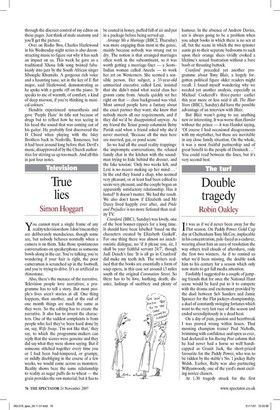True lies
Simon Hoggart you cannot trust a single frame of any reality television show. I don't mean they are deliberately mendacious, though some are, but nobody behaves normally when a camera is on them. Take those spontaneous conversations on speakerphone as someone bowls along in the car. You're talking, you're wondering if your hair is right, the poor cameraman is scrunched up in the footwell, and you're trying to drive. It's as artificial as rhinestone.
Also, there's the menace of the narrative. Television people love narratives; a programme has to tell a story. But most people's lives aren't stories at all. One thing happens, then another, and at the end of one month things are much the same as they were. So the editing has to create the narrative. It also has to invent the characters. One of the saddest complaints is from people who feel they've been hard done by on, say, Wife Swap. 'I'm not like that,' they say, to which the programme-makers can reply that the scenes were genuine and they did say what they were shown saying. But if someone stitched together every time you or I had been bad-tempered, or grumpy, or mildly disobliging in the course of a few weeks, we would come across as monsters. Reality shows bear the same relationship to reality as sugar puffs do to wheat — the grain provides the raw material, but it has to be coated in honey, puffed full of air and put in a package before being served up.
Arrange Me a Marriage (BBC2, Thursday) was more engaging than most in the genre, mainly because nobody was strung out to dry. The notion is that arranged marriages often work in the subcontinent, so it was worth getting a marriage-fixer — a Scots– Indian woman called Aneela — to work her art on Westerners. She seemed a sensible person. Her subject, a 33-year-old unmarried executive called Lexi, insisted that she didn't mind what social class her groom came from. Aneela quickly set her right on that — class background was vital. Most unwed people have a fantasy about the exact partner they want; she knew that nobody meets all our requirements, and if they did we'd be disappointed anyway. As my friend the Texan gossip columnist Betsy Parish said when a friend asked why she'd never married, 'Because all the men here are married, gay, or pond scum.'
So we had all the usual reality trappings: the impromptu conversations, the relaxed family chat in the kitchen with the soundman trying to hide behind the dresser, and the fake tension: 'Only two weeks left, and Lexi is no nearer making up her mind ... ' In the end they found a chap, who seemed very pleasant, or at least had been edited to seem very pleasant, and the couple began an apparently satisfactory relationship. Has it lasted? It doesn't matter. We had the result. We also don't know if Elizabeth and Mr Darcy lived happily ever after, and Pride and Prejudice is no more fictional than reality TV.
Cranford (BBC1, Sunday) was lovely, one of the best bonnet-rippers for a long time. It should have been labelled 'based on the characters created by Elizabeth Gaskell'. For one thing there was almost no anachronistic dialogue, no `if it please you, sir, I shall be your faithful servant 24/7', though Judi Dench's line 'It is all go in Cranford' did make my teeth itch. The writers realised that the books are essentially a form of soap opera, in this case set around 13 miles south of the original Coronation Street. So there has to be love, loathing, death, disaster, lashings of snobbery and plenty of humour. In the absence of Andrew Davies, sex is always going to be a problem when you adapt books in which there is no sex at all, but the scene in which the two spinster aunts go to their separate bedrooms to suck upon their orange slices vividly evoked a lifetime's sexual frustration without a bare boob or thrusting buttock.
Cranford preceded yet another programme about Tony Blair, a largely forgotten political figure older readers might recall. I found myself wondering why we needed yet another analysis, especially as Michael Cockerell's three-parter earlier this year more or less said it all. The Blair Years (BBC1, Sunday) did have the possible advantage of an interview with Blair.
But Blair wasn't going to say anything new or interesting. It was worse than Hamlet without the prince — it was Hamlet saying, 'Of course I had occasional disagreements with my stepfather, but these are inevitable in any close family situation. On the whole, it was a most fruitful partnership and of great benefit to the people of Denmark ... ' You could read between the lines, but it's very second-best.






































































 Previous page
Previous page